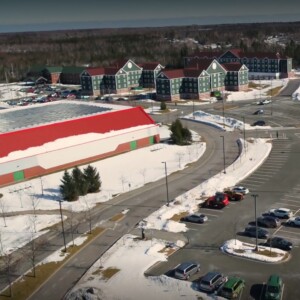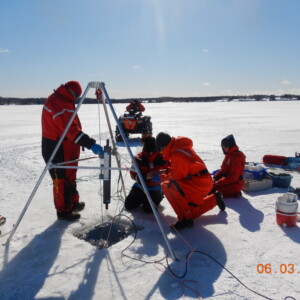
Sustainability
Cape Breton University has a history of taking action through substantial wind, solar and energy efficiency projects.
We are excited to announce our latest step towards sustainability with the CBU Climate Action Commitment. We are committed to meeting or exceeding the Nova Scotia Provincial targets of reducing our GHG emissions by 53% by 2030 and achieving net zero emissions by 2050. To learn more about our history, ambitions, and strategies, please read our Climate Action Commitment.
Quick Facts
- CBU is home to one of the largest solar installation on Cape Breton Island, with ~500 solar panels on the roof of the Canada Games Complex.
- With the installation of the 6.9MW Gardiner Mines Wind Farm, more electricity is provided to the grid than is consumed by our facilities.
- 2 of CBU’s newest buildings employ geothermal heating systems.
- Across campus, CBU has:
- installed water bottle fill stations,
- implemented double-sided printing, and
- continued its conversion to LED lighting and implementation of building automation and control systems.
Current Sustainability Initiatives
Sustainability Awards
- Inspired Educator (2018)
- In 2018, Cape Breton University received the Canada Green Building Council (CaGBC) Leadership and Green Building Award for Inspired Educator in honour of the institution’s commitment to sustainability, as demonstrated through research, teaching, and learning.
- Bright Business Community Award (2017)
- Each year, Efficiency Nova Scotia recognizes the province’s best-in-class energy efficient organizations, individuals, and communities. In 2017, Cape Breton University received the Bright Business Community Award for its work to inspire others to think and act differently and help distinguish Nova Scotia as a Canadian leader in energy efficiency.
- Clean Green Award (2016)
- In 2016, Cape Breton University received the Clean Green Award from the Sydney and Area Chamber of Commerce. Each year, the Chamber’s Excellence in Business Awards celebrate and honour local businesses and business leaders who have demonstrated outstanding business excellence.
Future Sustainability Initiatives
Presently, CBU is planning or working on sustainability initiatives related to:
- Upgrades to the lighting and control systems in the Boardmore Theatre,
- Complete electrification of the Canada Games Complex, eliminating the consumption of 100,000L of oil annually, and
- Implementation of a campus-wide energy management information system.









